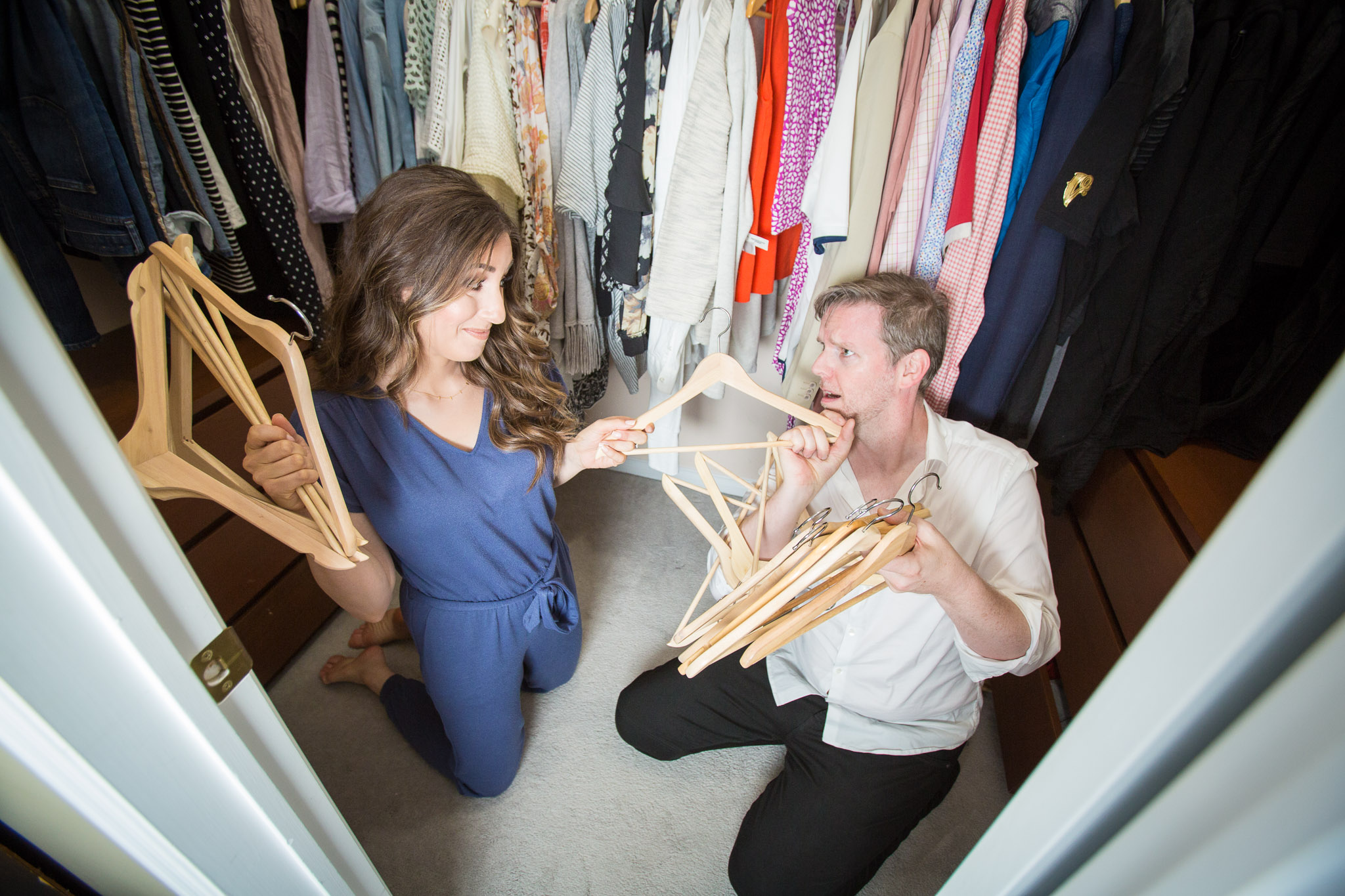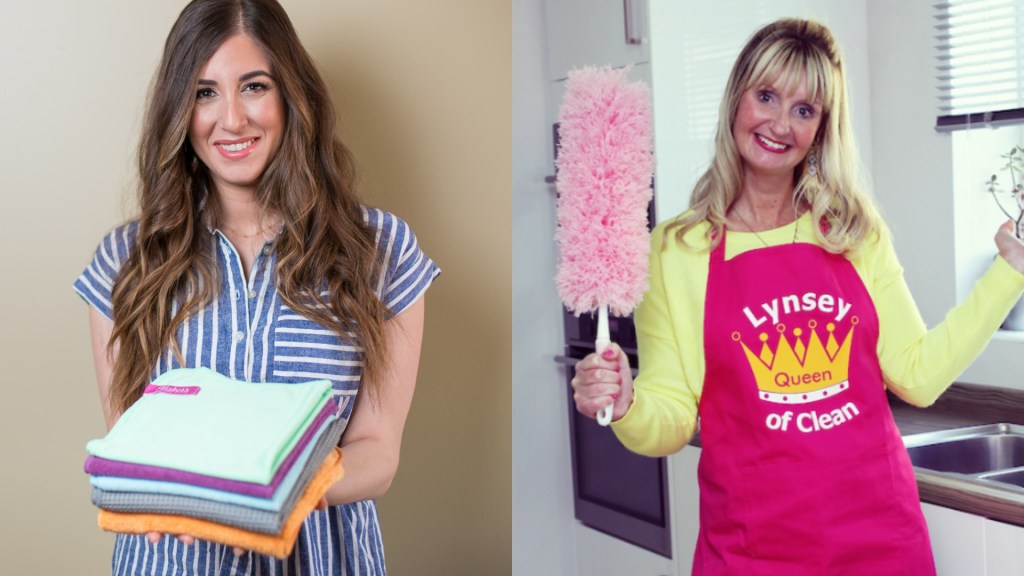The word “influencer” conjures up images of immaculately groomed young men and women posting OOTDs and #ads on their Instagram feeds. But bubbling up on Instagram is a newer and unlikelier trend: the cleaning influencer.
Women like Sophie Hinchcliffe (@mrshinchhome), Melissa “Clean My Space” Maker (@cleanmyspace), and Lynsey Crombie (@lynsey_queenofclean) have gained thousands of followers on the social media platform by posting pictures of their decluttered homes and Insta stories of themselves scrubbing their ovens and bathrooms clean.
Videos by VICE
Just as a beauty influencer might recommend their favorite highlighter or how to do your eyebrows, these cleaning influencers plug their top cleaning products and give tips on how to perfectly scrub a toilet, disinfect a kitchen sink, or clean baby vomit off a carpet.
Hinchcliffe—who recently hit 1.2 million followers and appears to have the biggest fanbase in the emerging genre—has even cultivated her slang: Cleaning is known as “hinching,” and trips to buy new household products are called “hinch hauls.” Her followers tag their own purchases and freshly cleaned homes with #hincharmy. “This hinching is getting addictive,” one fan wrote in the caption of an image of her own cleaning supplies on a kitchen counter, as perfectly arranged as luxury makeup on a beauty counter.
Watch: What It’s Like to Live with Zero Waste
Trend forecaster Geraldine Wharry connects the rise of cleaning influencers to the current fad surrounding wellness. “I think that it reflects the next generation of wellness products,” she tells Broadly. “It seems like the influencers are leaning towards that way: ‘Do you want to feel good? Then clean.’”
Crombie, 40, agrees: “People don’t like cleaning. Influencers are changing that perspective. We’ve spun it on its head and made it seem fun. A clean space is a happy space—it’s better for your mental health.”
The Peterborough-based mother of three was among the first in the UK to truly cotton on to the possibilities of being a cleaning influencer. She first appeared on the British TV show Obsessive Compulsive Cleaners, which sent obsessive cleaners to clean some of the country’s dirtiest homes. The show has been criticized by mental health charity OCD Action for not taking the condition seriously, but it also gave Crombie her big break—and the name of her brand.
“I was running a magazine at the time, and they contacted me to put an advert on the show,” she says. “Next thing you know, I’m auditioning to be one of the cleaners.” Crombie herself has never been diagnosed with OCD: “I don’t need a doctor to tell me what’s wrong with me,” she says, “but I use it to my advantage, I turned it into something positive instead.” A friend she made from the program gave her an apron that said “The Queen of Clean,” and the nickname stuck.

Crombie now runs her own cleaning company and is a guest presenter on the Ideal World Shopping channel, but the majority of her day is taken up by her Instagram. She says she gets all her grid posts up by 7AM, posts up to 50 Instagram Stories a day, and tries her best to answer the 800 or so questions she receives every day from her followers. “I’m like a cleaning guru,” she laughs, “a Bible of wealth and knowledge.”
She only joined the platform on a whim when her kids signed up, but says that it is now the most profitable arm of her business. “I did this by complete chance,” she says. “It’s like it fell into my lap—some things are meant to happen.” Her first sponsored content post got her £500—these days, she gets paid £1,000 for a single post. “When I first started working and I got my first brand deal, me and my husband were in complete shock. We couldn’t believe it.”
Canadian influencer Melissa Maker was 29 when she started uploading cleaning videos (sometimes co-starring her husband, Chad) to YouTube. She already had her own cleaning company and initially saw her Clean My Space channel as a way to promote her Toronto-based firm of the same name.
Unlike Crombie, who tells me that her idea of fun involves vacuuming her house, Maker openly admits that she hates cleaning. “Do you know the Tasmanian Devil, the cartoon character?” she asks. “I embodied it growing up… The joke with my mom is, she still can’t get over anything I’m doing with cleaning because I was such a messy child.” She started her firm after quitting her banking job and spotting a gap in the market for a reliable cleaning company. “I wanted to do something really fun, like designer swimwear or earrings, but all the universe kept sending me was cleaning, so I was like, I have to do this.”

Seven years on, she has over a million YouTube subscribers, close to 64,000 Instagram followers, her own book (also called Clean My Space), and a microfiber cloth company called Maker’s Clean. She’s even been on The Today Show and The Rachael Ray Show. Maker declines to name figures, but describes her profits as “pretty effing awesome.”
The emergence of cleaning influencers has been controversial. The sight of women posting selfies of themselves praising the merits of a clean home or a particularly good scrubbing brush has attracted its share of criticism. “Across the world, women work longer hours than men, but the majority of those hours are unpaid,” wrote Metro journalist Rebecca Reid. “Cleaning, childcare, and cooking are not acts which are valued financially. They are expectations, things which just have to happen. So it’s women who do them. So to see women in their thousands taking to Instagram to blindly revel in these acts of unpaid drudgery sets my teeth on edge.”
Reid is right on the amount of uncompensated labor that women perform—OECD data shows that women spend an average of 4.5 hours every day on unpaid domestic work like cooking and cleaning. Men put in half of that amount. Crombie agrees that domestic work should be shared out equally, but takes issue with Reid’s conclusion that this is drudgery that should not be celebrated on Instagram. In October, she even went on Good Morning Britain to debate Reid on the subject. “What we’re doing is encouraging women,” she tells me, “saying you can be a modern woman and a successful business owner, but also maintain a clean, structured family home.”
Crombie says that her family divides up the chores, with her husband maintaining the outside of their property and car, and the children maintaining their own bedrooms, helping with the dishwasher and laundry, and looking after the dog. “It’s about multitasking, but including your family in it to break the tasks down. In the 50s, the women would have done everything.”
Maker is keenly aware of the gendered connotations of housework, especially once she realized that her YouTube audience was 25 percent male and that presuming the gender of her audience would potentially alienate them. ”[Chad and I] started to use more gender-neutral language,” she says of their videos. “We didn’t want to play into the whole, ‘Oh, women are perfect housewives who make their houses look beautiful,’ because that’s just not reality.”
Now, Maker makes sure to use gender-neutral terms like “spouse,” “partner,” or “better half” in the videos, as opposed to “wife” or “girlfriend.” “We just wanted to make our content approachable for everyone—no matter the age, how much money they have, or the gender. We just want them to enjoy and learn something.”
Wharry is a little more sceptical, citing the fact that female cleaning influencers still vastly outnumber their male counterparts. (In fact, I couldn’t find a single man—barring Maker’s husband—who has built a social media profile based on cleaning.) “I mean, there’s nothing wrong with having a clean house, but maybe it is a little bit gender-biased. Maybe, without realizing it, they’re promoting a certain image of a woman who should be cleaning the house.
For More Stories Like This, Sign Up for Our Newsletter
She believes that the influencer trend is associated with a broader uptick in public purchasing around the home, including home fragrances and accessories. “As people feel more insecure, they’re going to nest more, save money, be more careful about spending, and use more affordable items. More approachable routines can be something that are more celebrated—like you feel like you have access to a certain kind of luxury if you buy a gorgeous candle that makes your home smell beautiful.”
That certainly makes sense for Crombie, who is evangelical about the winter-themed scents of her favorite household disinfectant, Zoflora, and professes to a genuine love of cleaning. Others, like Maker, are a little more circumspect about the social media fame that they have accumulated. “As an influencer, I feel a heavy responsibility to show what real life looks like and that life is not perfect all the time,” she says. “I’ve always tried to be very real and help the audience feel normal. Everyone struggles to find their place in the world, and Instagram can really hurt or help that.”
More
From VICE
-

Andrew Harnik/Getty Images -

Design Pics/Getty Images -

AEW -

Ronald Martinez/Getty Images
